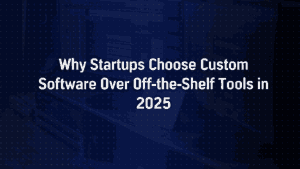Custom Software vs. No-Code Builders: What Founders Need to Know
Startup founders today face a crucial choice: build fully custom software or use no-code/low-code platforms. Each path has trade-offs in time to market, development cost, flexibility, and long-term value. Industry data show no-code/low-code is booming; by 2025, 70% of new business apps are expected to be built on such platforms. This reflects how quickly no-code can get an MVP up and running. However, tech experts note that custom development “grants complete flexibility and control to build highly complex, customized applications.” In practice, Empyreal Infotech‘s projects illustrate both sides: they’ve helped startups launch fast with white-label components and delivered deeply custom solutions when needed. Below, we compare the two approaches by key factor.
Time to Market
-
- No-Code/Low-Code: Designed for speed. Drag-and-drop builders and templates mean founders can prototype in days or weeks, not months. One comparison found that a typical custom app takes 2–5 months to develop, whereas no-code tools can cut that by up to 80%, delivering a working app in 2–3 weeks. Rapid time-to-market is crucial for early-stage startups testing ideas. In line with this, Empyreal notes that using its pre-built white-label modules lets clients launch in just weeks. For example, a hypothetical fintech startup “licensed Empyreal’s banking module” and had a fully branded finance app live in days instead of months.
-
- Custom Software: Building from scratch requires a full development lifecycle. Teams must gather requirements, write and test all code, and fix bugs. Even with agile sprints, this typically means 3 months of work before launch. Empyreal’s own process involves multi-week sprints, design reviews, and QA loops. The benefit is thoroughness and quality, but the trade-off is slower delivery. In short, no-code dramatically accelerates early development, while custom dev delivers a more polished product on a longer timeline.
Cost and Budget
-
- No-Code/Low-Code: Very low upfront cost. You pay only platform fees (often on the order of $10–$500 per month) instead of salaries. Sommo’s CEO notes that building an app with custom code “could cost tens of thousands of dollars” for an MVP, whereas no-code is “much more efficient” for small budgets. Non-technical founders can even build parts of the app themselves, saving on developer salaries. The downside is ongoing subscription fees and potential limits if the app needs to scale
-
- Custom Software: High initial investment. Hiring developers or contracting an agency usually means tens of thousands of dollars just to get an MVP, per industry estimates. Empyreal’s white label clients avoid hidden overruns by paying one fixed project fee. In their words, a startup “pays Empyreal once and gains full ownership of the branded product, saving potentially hundreds of thousands” in staffing costs. In other words, custom dev has a steeper upfront cost, but it can be more predictable. Notably, if a project is expected to run for many years, custom development often has a lower total cost of ownership (see Long-Term Value below).
Flexibility and Customization
-
- No-Code/Low-Code: Generally limited to the platform’s features and templates. You can customize layouts and simple workflows, but you can’t write arbitrary code. For example, tools like Bubble or Glide work great for standard use cases, but they lock you into their ecosystem. Bubble does not let you export the source code, so you’re stuck on its servers. Many experts note that no-code cannot “rival the distinctiveness of custom software” startups needing advanced or niche features often find no-code too restrictive. In practice, no-code builders are ideal for straightforward apps, internal tools, or proof-of-concepts, but they can’t handle everything.
-
- Custom Software: Offers unmatched flexibility. With custom code, you can implement any feature or integration you imagine. Empyreal’s engineers emphasize that “we wrote every line of code ourselves, so we could implement any feature or user flow exactly as needed.” They can optimize database queries, use native device APIs (GPS, camera, push notifications), and integrate new services on demand. This level of control means you aren’t confined by templates: every UI element, workflow, and data model can be tailored. For instance, one Empyreal client needed a very specific user interface and data pipeline that off-the-shelf tools couldn’t deliver; Empyreal built it from the ground up to handle thousands of users. In short, custom dev yields a one-of-a-kind product; no-code is limited by what its platform designers allow.
Long-Term Value and Ownership
-
- No-Code/Low-Code: Good for short-term proofs of concept, but comes with caveats. Since your app lives on someone else’s platform, you’re vulnerable to pricing changes or shutdowns. Migrating off a no-code platform later can be costly and time-consuming. One guide warns that many apps “outgrow” no-code tools: as products become complex, performance bottlenecks or missing features appear, and rewriting becomes inevitable. In fact, industry commentary notes that switching from no-code to a custom solution midstream “can take time and cost more.” There’s also the issue of vendor lock-in: you don’t own the underlying code, just your data and configurations.
-
- Custom Software: Generally better long-term ROI for growth-stage projects. You own all the code and IP, so you can modify it forever. Empyreal highlights that owning the code means “no more worrying about vendor lock-in or forced migrations.” You can refactor, add new tech (AI, new databases, etc.), and scale as needed. Analysts note that for projects intended to run 5+ years, custom development often yields a lower total cost of ownership. In addition, custom solutions protect proprietary technology. If your competitive advantage relies on unique algorithms or data models, custom dev “protects these assets.” In sum, custom-built apps tend to last longer and better adapt to changing needs. As one summary puts it, custom apps “last longer because you own the code” and aren’t tied to third-party limitations.
Empyreal Infotech in Action
Empyreal Infotech’s portfolio illustrates how smart choices depend on context. In their white-label projects, Empyreal leverages reusable modules to save time and money. For example, they describe a hypothetical fintech startup “FinEdge” that licensed Empyreal’s pre-built banking module and launched a secure payments app in days. The client simply rebranded Empyreal’s code, added features like digital wallets, and went live almost instantly. Similarly, a retail marketplace “ShopLift” needed ecommerce and CRM features fast. With only three devs on staff, they used Empyreal’s ready-made backend (catalog, checkout, customer management). The result: they handled unprecedented traffic during a Cyber Monday launch without building those features from scratch. In healthcare, a startup “MediLink” adopted Empyreal’s telehealth platform and launched an app with video calls and digital prescriptions in just a few months, far faster than writing it all anew.
At the same time, Empyreal delivers fully custom solutions when needed. In another case study, a client had a very specific UI and data pipeline requirement beyond any template. Empyreal built this from the ground up, using modern architectures and rigorous QA. The outcome was a robust, scalable app serving thousands of users, one that the COO says was “our vision made real” without compromise. This dual capability means Empyreal can offer the “best of both worlds”: start with a fast, battle-tested core and then extend or customize it indefinitely. As Empyreal’s team notes, startups get the speed of a white-label kickstart plus the adaptability of custom architecture. In all these projects, the founders’ brand remained front-and-center while Empyreal quietly tuned the technology behind the scenes.
Side-by-Side Comparison: Key Factors
-
- Speed: No-code/low-code dramatically shrinks development time (often weeks). Custom software typically needs several months to ensure quality. (Empyreal’s case: FinEdge app launched in days with modules.)
-
- Initial Cost: No-code requires minimal startup capital (platform fees only). Custom dev demands a large upfront investment (developers, infrastructure). (Custom example: Empyreal’s fixed-fee contracts avoid overruns.)
-
- Flexibility: No-code tools offer limited templates; they cannot match the full control of custom code. Complex or unique features often force a custom move.
-
- Scalability & Maintenance: No-code platforms may hit performance limits as your user base grows and could incur high subscription costs long-term. Custom software can be scaled (e.g. optimized databases, microservices) on your own terms. Over 5+ years, custom often wins on total cost and robustness.
-
- Ownership: With no-code, you rely on an external platform (risking lock-in). Custom development gives you full ownership of the code and IP. Experts note that owning your software “gives [your startup] a competitive edge” by aligning perfectly with your business model.
Expert Insights
Industry voices consistently emphasize that context is key. A Gartner/Kissflow study projects that low-code/no-code will power 70% of new business apps by 2025, reflecting its value for quick launches and lean teams. Vonage’s VP Amitha Pulijala explains that low-code “mitigates talent shortages” by letting companies build with smaller teams. Sommo (a no-code agency) agrees: no-code is “a gamechanger” when speed and low budget are top priorities.
On the flip side, custom development is praised for delivering long-term value. ValueCoders and others advise that startups consider their 3–5 year vision. If you need a product to scale or to protect proprietary features, custom dev pays off. As one expert summarized, custom software “provides tailored solutions that align perfectly with [your] business model, giving [you] a competitive edge.” In practice, many successful startups (Slack, WhatsApp, Airbnb, etc.) initially outsourced tech or used pre-built modules before building custom, a pattern Empyreal emulates with its stealth-partner model.
In summary: No-code/low-code lets founders move quickly and cheaply for simple apps or prototypes, freeing them to focus on customers. Custom software is the right choice when your app must scale, integrate deeply, or deliver a unique user experience. Empyreal Infotech’s experience shows that smart founders often blend approaches: start with ready-made components to launch fast, then invest in custom code for flexibility and growth. The best approach depends on your startup’s stage, budget, and vision, but having a clear strategy on these factors will set you on the path to success.




